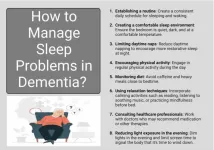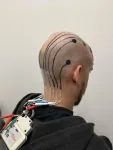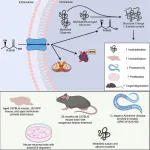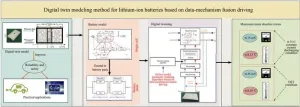Sleep deprivation in dementia: Heart disease, diabetes, anxiety, and thyroid disorders
"Sleep disturbances are a significant concern in individuals with dementia, affecting their overall health and quality of life, as well as that of their family members and caregivers.”
2024-12-02
(Press-News.org)
"Sleep disturbances are a significant concern in individuals with dementia, affecting their overall health and quality of life, as well as that of their family members and caregivers.”
BUFFALO, NY- December 2, 2024 – A new review was published on the cover of Aging (listed by MEDLINE/PubMed as "Aging (Albany NY)" and "Aging-US" by Web of Science) Volume 16, Issue 21, titled, “Sleep deprivation in dementia comorbidities: focus on cardiovascular disease, diabetes, anxiety/depression and thyroid disorders.”
The review, authored by Upasana Mukherjee, Ujala Sehar, Malcolm Brownell, and P. Hemachandra Reddy from Texas Tech University Health Sciences Center, compiles findings from recent studies on how sleep problems—such as insomnia, sleep apnea, and disrupted sleep cycles—can worsen dementia and accelerate cognitive decline. It also emphasizes the profound impact of these sleep disorders on caregivers, who often face burnout and emotional stress.
Dementia is a condition that significantly impairs the ability to think, remember, and make decisions, making everyday life increasingly difficult to manage. Sleep problems are a major challenge for individuals with dementia, with more than half experiencing disturbed sleep. These disturbances include difficulty falling asleep, staying asleep, or engaging in nighttime wandering.
Such issues go beyond causing fatigue—they accelerate memory loss, increase confusion, and raise the risk of behavioral symptoms like agitation. Addressing sleep challenges is critical to improving quality of life for both patients and their caregivers. Caregivers, who often support loved ones around the clock, face significant stress when dealing with these sleep disorders.
“This situation creates a vicious cycle where caregiver distress exacerbates patient symptoms, further increasing the burden on caregivers.”
This review also explores how other illnesses, common in older adults with dementia, worsen sleep disturbances. Conditions such as diabetes, thyroid dysfunction, heart disease, and anxiety disrupt sleep, and poor sleep then worsens both the dementia and the underlying illnesses. For instance, untreated sleep apnea can significantly accelerate cognitive decline in people with dementia.
To improve sleep for dementia patients, the authors recommend holistic approaches that address both sleep disturbances and related health conditions. Simple changes, such as establishing a regular bedtime routine, reducing nighttime noise, and encouraging daytime physical activity, can significantly enhance sleep quality.
Non-pharmacological treatments, including light therapy and cognitive behavioral therapy for insomnia, have also shown promise. Managing coexisting conditions such as diabetes or anxiety can help reduce the severity of sleep issues. The authors emphasize the need for more research into targeted, multidisciplinary approaches to effectively manage sleep disturbances, improve patient well-being, and reduce caregiver stress.
In conclusion, this review highlights the critical need for a more comprehensive approach to dementia care. Improving sleep could slow the progression of dementia, reduce caregiver stress, and enhance the quality of life for everyone involved. As dementia cases rise worldwide, addressing sleep issues will become an increasingly important aspect of care.
Read the full paper: DOI: https://doi.org/10.18632/aging.206157
Corresponding author: P. Hemachandra Reddy - hemachandra.reddy@ttuhsc.edu
Video short: https://www.youtube.com/watch?v=lrrrXabMjjM
Keywords: aging, dementia and comorbidities, sleep disturbances, cardiovascular disease, diabetes, thyroid disorders, anxiety, insomnia, sleep apnea
Click here to sign up for free Altmetric alerts about this article.
About Aging:
The journal Aging aims to promote 1) treatment of age-related diseases by slowing down aging, 2) validation of anti-aging drugs by treating age-related diseases, and 3) prevention of cancer by inhibiting aging. (Cancer and COVID-19 are age-related diseases.)
Aging is indexed by PubMed/Medline (abbreviated as “Aging (Albany NY)”), PubMed Central, Web of Science: Science Citation Index Expanded (abbreviated as “Aging‐US” and listed in the Cell Biology and Geriatrics & Gerontology categories), Scopus (abbreviated as “Aging” and listed in the Cell Biology and Aging categories), Biological Abstracts, BIOSIS Previews, EMBASE, META (Chan Zuckerberg Initiative) (2018-2022), and Dimensions (Digital Science).
Please visit our website at www.Aging-US.com and connect with us:
Facebook
X
Instagram
YouTube
LinkedIn
Reddit
Pinterest
Spotify, and available wherever you listen to podcasts
Click here to subscribe to Aging publication updates.
For media inquiries, please contact media@impactjournals.com.
Aging (Aging-US) Journal Office
6666 E. Quaker St., Suite 1
Orchard Park, NY 14127
Phone: 1-800-922-0957, option 1
END
[Attachments] See images for this press release:


ELSE PRESS RELEASES FROM THIS DATE:
2024-12-02
For the first time, scientists have invented a liquid ink that doctors can print onto a patient’s scalp to measure brain activity. The technology, presented December 2 in the Cell Press journal Cell Biomaterials, offers a promising alternative to the cumbersome process currently used for monitoring brainwaves and diagnosing neurological conditions. It also has the potential to enhance non-invasive brain-computer interface applications.
“Our innovations in sensor design, biocompatible ink, and high-speed printing pave the way for future on-body manufacturing of electronic tattoo sensors, with broad applications both within and beyond ...
2024-12-02
Ketone bodies, produced by the body to provide fuel during fasting, have roles in regulating cellular processes and aging mechanisms beyond energy production. Research at the Buck Institute shows that ketone bodies can best be understood as powerful signaling metabolites affecting brain function in aging and Alzheimer’s disease. A new study demonstrates that ketone bodies and similar metabolites have profound effects on the proteome and protein quality control in the brain. Publishing in Cell Chemical Biology, Buck Institute scientists, ...
2024-12-02
About The Study: In this retrospective medical record review study, rules-based e-triggers were useful for post hoc detection of missed opportunities in diagnosis in emergency department visits. Interventions to target emergency department work system factors are urgently needed to support patient-clinician encounters and minimize harm from diagnostic errors.
Corresponding Author: To contact the corresponding author, Hardeep Singh, MD, MPH, email hardeeps@bcm.edu.
To access the embargoed study: ...
2024-12-02
About The Study: The findings of this study suggest the need for greater scrutiny of crisis pregnancy center practices, particularly their service provision, provider qualifications, and how these conform with regulations or best practices. A key concern is their promotion of abortion pill reversal, which lacks FDA approval or scientific support and may cause harm.
Corresponding Author: To contact the corresponding author, John W. Ayers, PhD, MA, email ayers.john.w@gmail.com.
To ...
2024-12-02
La Jolla, Calif. (December 2, 2024) — A new study from scientists at the University of California San Diego introduces a powerful new approach to understanding the operation of crisis pregnancy centers, non-profit organizations dedicated to an anti-abortion agenda. The study published in JAMA Internal Medicine provides the first account of the practices of crisis pregnancy centers (CPC) operating in the United States.
"While our study shows crisis pregnancy centers provide valuable community services, like parenting classes, there is a clear need for consumer safety measures to prevent the promotion and use of their ...
2024-12-02
A team of astronomers has found that Venus has never been habitable, despite decades of speculation that our closest planetary neighbour was once much more like Earth than it is today.
The researchers, from the University of Cambridge, studied the chemical composition of the Venusian atmosphere and inferred that its interior is too dry today for there ever to have been enough water for oceans to exist at its surface. Instead, the planet has likely been a scorching, inhospitable world for its entire history.
The results, reported in the journal Nature Astronomy, have implications for understanding Earth’s uniqueness, and for the search for life on planets outside ...
2024-12-02
The deep neural network models that power today’s most demanding machine-learning applications have grown so large and complex that they are pushing the limits of traditional electronic computing hardware.
Photonic hardware, which can perform machine-learning computations with light, offers a faster and more energy-efficient alternative. However, there are some types of neural network computations that a photonic device can’t perform, requiring the use of off-chip electronics or other techniques that hamper speed and efficiency.
Building on a decade of research, scientists from ...
2024-12-02
Researchers from the Organoid group (previously Clevers group) at the Hubrecht Institute have developed a new organoid that mimics the human fetal pancreas, offering a clearer view of its early development. The researchers were able to recreate a complete structure that includes the three key cell types in the pancreas, which previous organoids couldn’t fully mimic. Notably, the team identified a new stem cell that develops into the three cell types. These findings, published in Cell ...
2024-12-02
Researchers at EPFL and Lausanne University Hospital (CHUV), led by professors Grégoire Courtine and Jocelyne Bloch, have achieved a major milestone in the treatment of spinal cord injuries (SCI). By applying deep brain stimulation (DBS) to an unexpected region in the brain—the lateral hypothalamus (LH)—the team has improved the recovery of lower limb movements in two individuals with partial SCI, greatly improving their autonomy and well-being.
Wolfgang Jäger, a 54-year-old from Kappel, Austria, has been in a wheelchair ...
2024-12-02
Source: Beijing Institute of Technology Press
Lithium-ion batteries are celebrated for their high specific energy, long service life, and low self-discharge rates. However, ensuring their reliability and safety under various operating conditions is critical for their continued success in industrial applications. Digital twin technology, which creates a virtual replica of a physical entity, offers a promising solution by enabling real-time monitoring and optimization of battery performance. This technology facilitates interactive feedback, data fusion, and iterative ...
LAST 30 PRESS RELEASES:
[Press-News.org] Sleep deprivation in dementia: Heart disease, diabetes, anxiety, and thyroid disorders
"Sleep disturbances are a significant concern in individuals with dementia, affecting their overall health and quality of life, as well as that of their family members and caregivers.”






